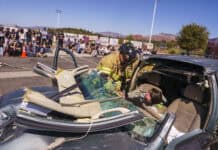Until 2014, Sedona City Council elections would kick off in March and conclude in May. The council election was also divorced from other ballots, meaning Sedona voters had one campaign on which to decide.
The Arizona State Legislature moved all general elections to November, meaning local elections are on the same ballot as national races. Primary elections moved to August and because municipal council elections are nonpartisan, the August vote is the one that decides city and town elections with the November ballot deciding runoffs, if needed.
The primary election is a partisan vote, meaning Democrats vote for Democrats, Republicans vote for Republicans and Libertarians vote for Libertarians. Every citizen gets to vote for nonpartisan local elections like their town council and city council.
The Democratic and Republican parties in Arizona have opened up their election to Independents and those registered with nonofficial parties, meaning an Independent who chooses a Republican ballot gets to vote for the same candidates as a registered Republican would.
Statewide seats — governor, attorney general, superintendent of public instruction, etc. — are held in midterm years, so won’t be on the ballot until 2022.
- For Arizona Corporation Commission, there are three Democrats and two Republicans running for three open seats so the primary is effectively uncontested.
- For U.S. Senate, incumbent Republican Martha McSally is facing challengers Sean Lyons and Daniel McCarthy on the Republican side while Mark Kelly and Bo Garcia are running for the Democratic nomination.
- For U.S. House of Representatives District 1, incumbent Democrat Tom O’Halleran is facing Democrat challenger Eva Putzova while Nolan Reidhead and Tiffany Shedd are running for the Republican nomination.
- For Arizona State Senate District 6, incumbent Republican Sylvia Allen is facing Republican challenger Wendy Rogers while Democrat Felicia French is running uncontested.
- For Arizona House of Representatives District 6, incumbent Republican Walt Blackman is joined by Republican Brenda Barton while Coral Evans is running on the Democratic side. Because voters choose two candidates for the two seats, all three are running uncontested until November.
- There are two candidates for Yavapai County Supervisor District 3, but incumbent Randy Garrison is a Republican and challenger Donna Michaels in a Democrat, so they won’t face off until November.
- Likewise, for Coconino County Supervisor District 3, incumbent Democrat Matt Ryan and Republican challenger Byron Peterson are treading water until November.
- All the other Coconino County elected positions are held by Democrats who face no challengers from either party while the other Yavapai County elected positions are held by Republicans who face to challengers from either party, save one: Incumbent Yavapai County Attorney Sheila Polk is facing Republican challenger David Stringer.
- On the nonpartisan portion of the ballot, there are four candidates running for three seats on Sedona City Council: Kathy Kinsella, write-in candidate Ed Larrieu, Holli Ploog and incumbent Jessica Williamson.
- For mayor of Sedona, incumbent Sandy Moriarty is facing challengers Kurt Gehlbach and write-in candidate Michael Werner.
Voters can choose up to three candidates in the council race, so if 3,000 citizens vote, there are potentially 9,000 votes that could be cast. If 400 people only vote for two candidates, there would be theoretically 8,600 votes cast. According to the state’s formula, those 8,600 votes would be divided by the number of seats — by three for 2,866⅔ — then cut in half to 1,433⅓ — and rounded up to the nearest whole number, 1,434, marking the theoretical threshold candidates need to win the primary outright.
Because the election is held across two counties, the votes are determined by adding up both counties’ votes and applying the formula.
The two counties don’t post at the same time and sometimes are hours apart — which is all great fun for journalists trying to inform residents about who won while refreshing the election results page every two seconds for hours.
If candidates fail to reach that threshold and seats remain open, candidates will head to the runoff in the general election. If there is a runoff, we will cover that race leading up to the vote on Tuesday, Nov. 3.
Many voters, especially younger ones, assume their individual votes do not matter. Part of that stems from the winner-take-all Electoral College to choose the United States president, which has allowed four men —Rutherford B. Hayes, Benjamin Harrison, George W. Bush and Donald Trump — to win the White House while losing the national popular vote.
All other elections are determined by popular vote, making all votes important from senator down to wastewater district commissioner.
Individual votes matter most importantly in small, local elections. In 2008, two candidates for Sedona mayor were separated by less than 10 votes, which spread a little wider on a recount. Had a dozen more people cast ballots, the election and the following years of governance could have been completely different.
Many state propositions are also often won by a slim number of votes. In 2010, Proposition 203, Arizona’s medical marijuana law, initially appeared to have failed, but as late and provisional ballots were counted, eventually won by 4,340 votes.
Early ballots need to be mailed by Wednesday, July 29, but they can be dropped off at ballot boxes until 7 p.m. Tuesday, Aug. 4 — there is one box at Sedona City Hall. The last day to vote early in person is Friday, July 31. Election day is Tuesday, Aug. 4. Polls will be open from 6 a.m. to 7 p.m. for in-person voting.
Christopher Fox Graham
Managing Editor



















